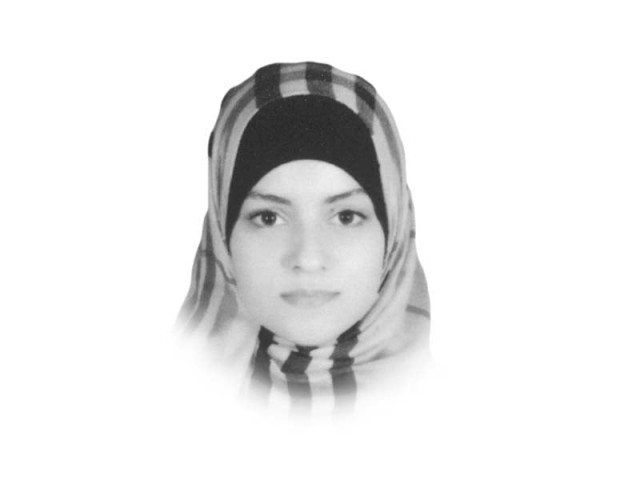The Syrian war theatre & the brutal Assad regime
Today the death toll has crossed a quarter of a million and number of internally displaced persons has gone beyond 10m

The writer is a journalist of Syrian origin based in Pakistan
The first response was that of live bullets, fired at the protestors who didn’t call for Assad’s ouster until the death toll reached 3,000 civilians. Defections from the Syrian Army soon increased to 2,000 officers, who claimed that they were receiving explicit orders to kill peaceful protestors indiscriminately.
Assad had in hand a wide range of weapons and torture techniques: skinning, firing live bullets, setting of nail bombs and even Scud missiles. These were merely the early gusts of the gathering storm. Assad was simply warming up for the fierce war to come. In the Syrian war theatre, Russia and Iran, the closest supporters and protectors of the Assad regime, missed no chance to supply it with weapons, military experts and diplomatic support. Syria is Russia’s 40-year-old ally since Hafez al-Assad established close ties with the Soviet Union. Politically, it is Russia’s only remaining ally in the Middle East. It strategically lies on the shores of the Mediterranean Sea, a pivotal asset for trade, gas riches and influence far beyond its borders. In a way it also protects Russia, where democracy is in decay, acting as a shield to deter the waves of change from reaching it. To Iran, Syria is the cornerstone in its project to spread its influence across the Middle East. Strategically, Syria creates a direct bridge between Iran and the Iranian-backed Hezbollah group in Lebanon, and losing Syria will result in Iran losing that bridge and ultimately losing its two allies in one go.
Numerous countries in the region have plunged into turmoil, but what makes Syria exceptional is the kind of destructive weapons used indiscriminately by the Assad regime, against civilians. Air defence has been assigned the primary task of quelling the revolution, which boils down to randomly dropping explosive barrels from helicopters on heavily populated rebel-held areas. This has caused the complete destruction of cities of historical significance such as Aleppo, Idlib and Deraa. These primitive barrel bombs, which weigh between 440 and 1,100 tonnes, are inexpensive and simple to make, allowing Assad to kill en masse. A Humans Rights Watch report published on August 5 describes them as “a do-it-yourself concoction of explosions and metal fragments contained in an oil canister”. The report asserts that these weapons “inflict far greater sufferings on Syrians than the Islamic State and the chemical weapons combined”. According to the Syrian Network for Human Rights, the number of deaths caused by these barrel bombs has reached almost 9,000 since February, 2014, when the UN Security Council (UNSC) passed a resolution to cease the dropping of these bombs, to which Assad turned a cold shoulder.
A diplomatic move was taken on August 14, when France introduced an initiative to create a team to document the use of barrel bombs by the Assad regime and report them to the UN, which will then raise the possibility of using unspecified penalties against the regime. But the US asked France to freeze the initiative until a Russian vote is secured against Assad’s use of chemical weapons.
Besides the catastrophe caused by Assad’s barrel bombs, there are also the tragedies that have ensued following the use of chemical weapons in the country. In August 2013, Assad’s forces launched the first chemical attack in Al-Ghouta, killing 1,400 civilians. His regime was then forced by Russia to sign a UN resolution in October 2013, to give up his 1,300 metric tonnes of chemical arsenal. On March 6, 2015, the UNSC adopted a new resolution regarding the use of toxic chemicals in Syria and decided that in case of non-compliance, measures under chapter seven will be implemented. Despite this, weapons of mass destruction made a strong comeback to the Syrian war theatre when, in April 2015, Human Rights Watch published a report accusing the Assad regime of using toxic chemicals during the period March 16-31, 2015, but this time by filling them in barrel bombs and dropping them on the city of Idlib, killing at least 206 civilians. The toxic chemicals-infested barrel bombs have taken the level of atrocities to a higher level, which mirrors the audacity of the Assad regime in mastering new death techniques.
Today the death toll has crossed a quarter of a million, keeping in mind that the UN has given up on keeping up with the death count in Syria since January 2014, and the number of the internally displaced persons and refugees has gone far beyond 10 million. With unstoppable defections, economic and military exhaustion and loss of land under its control, the Assad regime seems to be crumbling, but what keeps it on its feet even now is Russian diplomatic and military support and Iran’s military aid combined with the Al-Quds brigade’s commanding of the Syrian Army.
Published in The Express Tribune, September 12th, 2015.
Like Opinion & Editorial on Facebook, follow @ETOpEd on Twitter to receive all updates on all our daily pieces.















COMMENTS
Comments are moderated and generally will be posted if they are on-topic and not abusive.
For more information, please see our Comments FAQ